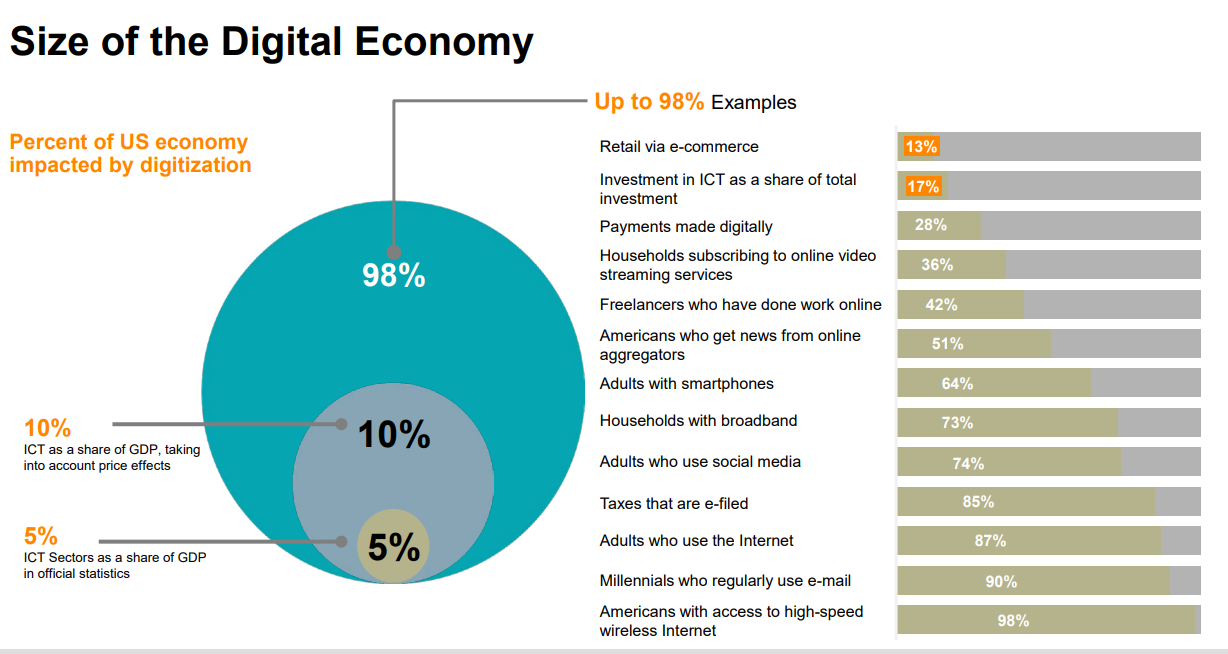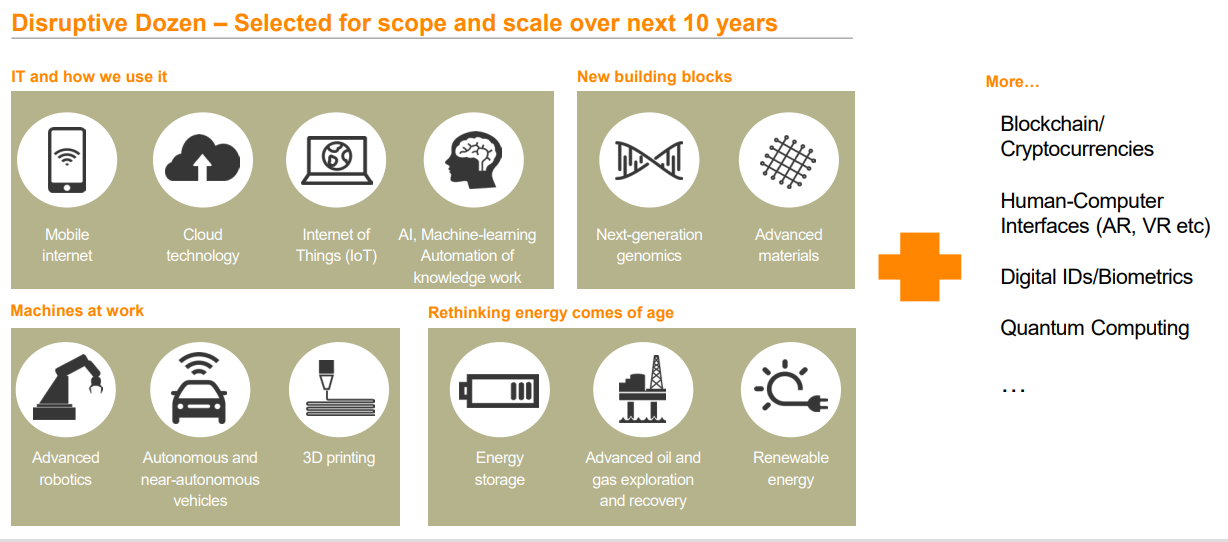The global economy is experiencing massive, accelerated digital transformation, resulting in the creation of new business models, innovative products and services, and very different ways of doing business.
Smartphone apps have encouraged the growth of the internet economy. Goods and services are being delivered via online platforms. Consumer spending is increasingly driving towards online sales. Digital IT solutions are replacing hardware. And data has become a valuable currency in this new digital age.
The digital economy is growing exponentially every year, and this is expected to continue at an accelerated rate in the near future.

 Image source: McKinsey
Image source: McKinsey
In this blog we'll discuss the term digital economy, define how it works and why businesses need to embrace the digital revolution, and facilitate cross-functional change. Resistance to this change could mean failure in this new digital world.
Read our blog 5 keys to unlocking digital transformation
Download a PDF of our Hybrid Workplace Guide 2.0

Download a PDF of our Hybrid Workplace Guide 2.0
What is a digital economy?
All successful, adaptive organizations in the twenty-first century are typically powered by digital technology. Simply put, digital transformation is enabling businesses to use the latest technology to help them achieve their goals, but faster, more efficiently, and more profitably.
A digital economy is built on digital platforms that facilitate business processes and enable better economic value. Hyperconnectivity is the backbone of digital business, expanding the connections between people, organizations, and machinery through the internet, mobile technology and IoT.
 Image source: Atria Innovation
Image source: Atria Innovation
In effect, emerging technologies have paved the way for a fourth industrial revolution and created innovative, almost limitless new ways to do business.
“Uber, the world’s largest taxi company, owns no vehicles. Facebook, the world’s most popular media owner, creates no content. Alibaba, the most valuable retailer, has no inventory. And Airbnb, the world’s largest accommodation provider, owns no real estate… Something interesting is happening.”
TechCrunch
 Image source: FourWeekMBA
Image source: FourWeekMBA
Understanding the key business models of the digital economy
To break it down, you can think of a digital business model as one that leverages digital technology to enhance several aspects of an organization. Every organization's business model is different, but in a digital economy, key aspects need to be considered, such as:
-
Creating the right digital infrastructure, often by combining aspects of an existing model to create a unique formula
-
Re-evaluating how the business acquires and retains customers
-
Reviewing or updating conventional notions about the products or services it provides
-
How it uses technology such as mobile applications and social media platforms to provide added value and enhance customer experience
-
How to make the best use of big data, advanced analytics, monitoring and performance management, AI and virtual reality to drive business processes
Features of the digital economy
The main characteristics of a digital economy include:
-
Internet-powered: The internet has become the the driver of the digital economy, making it possible for organizations to connect with new markets and target a better fit of customers.
-
World-encompassing: Location no longer limits businesses in a digital economy. The ease of global interconnection enables businesses to reach new markets and better maintain the customers they have.
-
Always-on: The technology, mobile apps and digital products offered by E-Commerce has allowed businesses to offer goods and services twenty four hours a day, seven days a week.
-
Fast-paced: Due to the almost constant flood of new technologies, and the innovation that brings with it, the digital economy moves at a far quicker pace, making it even more important for companies to keep up.
-
Data-driven: Data is at the heart of the digital economy. Using data and analytics, businesses are able to make more informed decisions about the product they offer, and formulate marketing strategies targeted perfectly at specific consumers.
-
Competitive: In a web economy, networked intelligence has enabled companies to ramp up the competition by being more aware of what consumers want, allowing them more choices, and forcing them to vie for their attention.
Key elements of a digital economy
Organizations who have undergone digital transformation, and are E-Commerce-driven, differ from traditional companies by relying on Information Technology to carry out economic activities and market their goods and services.
 Image source: Medium
Image source: Medium
This essentially gives them the ability to 'see into the future'. Without the means to capture data and analyze it in real time, it's far more difficult for non-digital companies to identify who their customers are, what they bought and when. Firms relying on retrospective information provided about their customers and business activities after the fact are at a distinct disadvantage in a digital economy.
In a digital economy, the internet, the use of smartphones and other technologies, and the power of analytics gives an E-business the means to create strategies to measure, analyze and improve customer experience (CX).
 Image source: Acquire
Image source: Acquire
Key benefits of a digital economy
With today's prevalence of a work-from-anywhere-culture, employees have come to expect the same level of connectivity as they had in a physical office.
Managing this virtual, highly flexible, globally interconnected new economy has meant that many organizations have had to re-think their economic activity, and how they package their digital goods. They've also had to re-evaluate the way they operate, and re-visit how they provide value to their consumers.
Read our guide Hybrid Workplace Models are the New Normal
Below are the key benefits of a digital economy-based approach:
The expansion of business opportunities
Firms who once had trouble breaking into new national and global markets have been able to forge new pathways and create new economic opportunities. Emerging technologies have allowed small businesses and enterprises in every industry to procure and distribute their goods and services across the globe.
The creation of new employment opportunities
The future of work has changed, and the digital economy is proving to have the potential to enhance productivity, increase income and improve social well-being by creating job opportunities in new markets, as well as boosting employment in some existing occupations. Internet-based workplace ecosystems have won out over traditional economy models, allowing the creation of millions of jobs worldwide in the last few years alone.
The enhancement of public services
Internet coverage throughout the world, along with the network effects of easily acquired information and communication offers a means to improve many public services such as health care, municipal activities and policing.
The rapid rise of E-Commerce
With the digitization of so many businesses, new technologies have made it easier and more profitable and affordable to produce and distribute goods and services. Digitization has also enabled easier delivery, marketing and tracking of these commodities, with the result of better service to consumers. In today's digital economy, anyone can buy any product or service conveniently and quickly online, from household goods, to healthcare access, entertainment or world travel.
The challenges and issues with a digital economy
While the digital economy has seen many companies thrive, success for any organization is determined by ownership and management of infrastructure and data. However, some companies, countries and cultural sectors are benefiting more from the digital economy than others. But there are other issues too.
The Great digital divide
Wealthy countries and businesses are far more connected digitally than poorer ones. Well over 90% of the world's data centres are in richer countries of Western Europe, North America and East Asia. Conversely, Latin American and African states are home to less than 2%.
 Image source: DataCenters
Image source: DataCenters
Seventy five percent of cloud computing and blockchain patterns as well as 50% of IoT spending happens in the US and China. They also capitalize over 90% of the world's largest digital platforms between them.
The monopolization of dividends
Only a small number firms have achieved dominant market positions in the worldwide marketplace, accounting for ninety percent of all revenue and profits:
Amazon, Alphabet, Apple, Google, Facebook, and Microsoft alongside Alibaba, Baidu, Huawei, Tencent, WeChat and ZTE. This dominance is forcing smaller organizations and manufacturers to invest heavily in restructuring and digitizing their operations, or face the risks of being extinguished.
The environment impact
-
The digital economy is creating a negative impact environmentally, including contributing to climate change. Tech companies, while insisting they are addressing of the issue of sustainable development goals, are still considered among the most environmentally damaging globally.
-
The upward spiral in demand for hardware is rapidly increasing the extraction of ramping-up extraction of rare earth minerals and other precious metals including cobalt.
-
On top of this, the rapid redundancy of technology, and the culture of discard rather than repair is contributing to an unprecedented amount of waste.
-
The rapid growth of internet services is consuming about one-tenth of the world's electricity production. Mass cloud migration is increasing energy consumption and carbon emissions, including from coal driven power plants. Additionally, servers, storage devices, cooling systems, and network devices in some of the world's largest data centers consume more than 100 MW of power, which equates to 80,000 US households.
The rise in cyber-crime
While digital technologies have enabled a new economy to thrive, the growth in online attacks means that cyber-security has become a top priority for organizations. In the same way that they are able to be exactly where the consumers are, cyber-criminals are becoming increasingly adept at infiltrating them.
The primary target for cyber-criminals is consumer data, which can be sold or traded to other criminals. Criminals can also steal sensitive information including credit card account numbers, social security numbers and other vital information that can be a huge risk to customers.
To remain competitive, and mitigate risk, the automation of security, scanning and assessment needs to match the rate of innovation and speed to market.
The importance of monitoring in a digital economy
Digital transformation for any organization means there will be challenges and issues in many areas. Every piece of new technology added to an IT infrastructure, whether it's software, hardware, remote devices, network or cloud components can cause potential problems resulting in down-time and risks to revenue.
While the digitally driven economy can open doors for enterprises and consumers, there is much to be considered in maintaining performance and user experience. From poor network performance and incompatibility of devices, to inconsistent network connection quality, below-par audio and video quality, security risks and system overloads, companies need a robust monitoring and performance management solution that can oversee it all.
Today's digital workplace could consist of dozens or even hundreds of different applications, devices, networks and locations. Companies need a clear view of what's going on everywhere, through a single pane of glass, as well as being able to monitor performance and respond to problems in real time.
IR Collaborate provides solutions to help you manage all of your communication and collaboration ecosystems including:
- Enterprise UC
- Managed Service Providers
- Contact Centers
- Customer experience testing
- Collaboration space management and much more.
Download a PDF of our Hybrid Workplace Guide 2.0

Download a PDF of our Hybrid Workplace Guide 2.0





